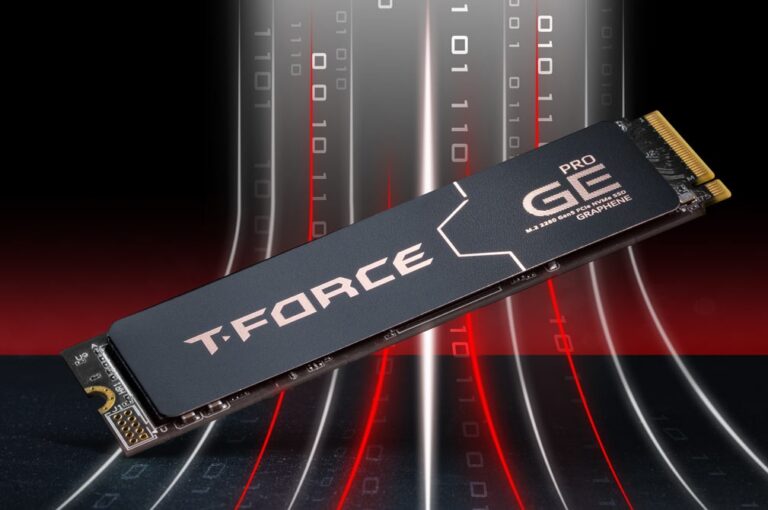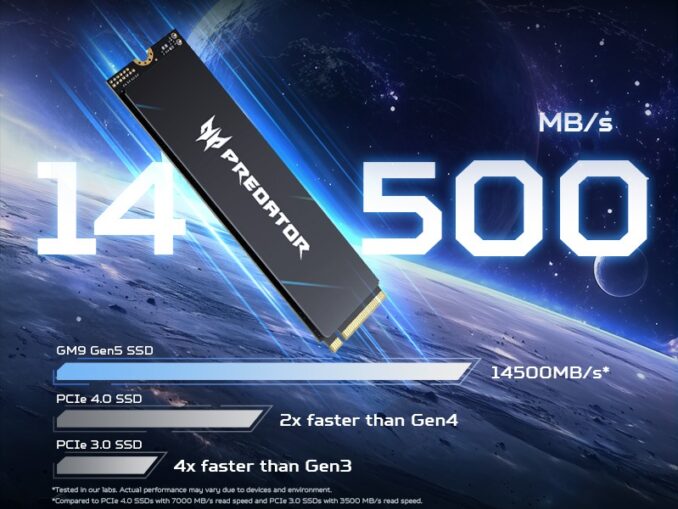
We recently resumed our exploration of Patriot products, and I’m excited to introduce the latest and fastest addition: the Patriot M.2 SSD from the Viper PV593 series. This new SSD is compatible with the NVMe PCIe 5.0 standard, offering not only high performance but also enhanced power management compared to earlier generations of PCIe 5.0 SSDs. The tested Viper PV593 SSD comes with a 2TB capacity, which is ideal for most gaming computers.
Let’s start with specifications and features, which will tell us what we will test.

Specifications and Features
With performance nearly twice as fast as PCIe Gen4 SSDs—and over four times faster than Gen3—the PV593 is engineered for users who demand speed without compromise. It features DRAM cache and dynamic SLC caching technology to reduce latency, accelerate system startup, and improve application launch times. With 4K random read/write speeds reaching up to 2000K/1650K IOPS, users can experience lightning-fast responsiveness across all tasks.
~Patriot Viper

Key Features
- PV593: The Apex of Speed, Forged for the Unrivaled
In the relentless pursuit of perfection, every millisecond shapes a lasting legacy. - The Viper PV593 flagship SSD embodies raw performance and unwavering conviction at its core — engineered for those who never settle.
- Powered by next-generation PCIe Gen5 x4 NVMe technology, the advanced SM2508 controller, and a refined 6nm architecture, it delivers blistering sequential speeds of up to 14,000 / 13,000 MB/s. From faster game loading to AI model training, from complex content creation to seamless multitasking, every action becomes instinctive — pushing past the boundaries you set.
- 14,000 / 13,000 MB/s: Blazing Fast. Cross-Generational. Unmatched.
With read/write speeds reaching up to 14,000 / 13,000 MB/s, the PV593 delivers double the performance of Gen4 SSDs and up to four times the speed of Gen3. - Launch massive games, edit high-resolution video, and process multi-track audio in an instant — all with zero lag. And for total flexibility, it’s fully backward compatible with PCIe 4.0 and 3.0 systems.
- TSMC 6nm Controller: Extreme Performance, Exceptionally Cool
Powered by the advanced Silicon Motion SM2508 controller and built on a cutting-edge 6nm process, the PV593 delivers ultra-fast data transfers with intelligent power management. - Even under sustained heavy loads, it stays cool and stable — empowering elite gamers and creators to keep pushing their limits.
- Flexible Fit, Limitless Scenarios
Built in the standard M.2 2280 form factor, the PV593 ensures broad compatibility with most motherboards and high-end systems. - Whether it’s a Gen3 or Gen4 platform, just plug in, play, and dominate from day one.
- Preemptive Speed: Never Miss a Beat
With 4K random read/write speeds up to 2,000K / 1,650K IOPS, the PV593 supercharges system boot-up and multitasking. - From instant in-game domination and seamless large-file editing to smooth multi-app switching, your actions stay one step ahead — what you think, you execute.
- Accelerated Excellence: Beyond Fast
With onboard DRAM cache and SLC dynamic caching, the PV593 dramatically boosts data transfer efficiency. - Enjoy shorter wait times, faster app launches, and a smoother, more responsive system — delivering an experience that feels truly unmatched.
- Up to 4TB
Available in 1TB, 2TB, and 4TB capacities, the PV593 lets you effortlessly store your large game library, professional-grade videos, large applications, and raw files. Capture every victory and creation — without compromise. - Five-Year Global Warranty
Behind this powerhouse performance, Patriot Memory stands firmly by your side. - We support your journey with a comprehensive five-year global warranty, delivering stability and confidence every step of your extreme conquest.

Specifications
| Patriot Viper PV593 SSD Specifications | |
| Form Factor |
M.2 2280 |
| Heatsink | No |
| Interface |
PCIe Gen 5.0 x4 |
| Max Sequential Read |
Up to 14000MB/s |
| Max Sequential Write |
Up to 13000MB/s |
| Storage Temperature |
-40°C to + 85°C |
| Operating Temperature |
0°C to +70°C |
| Endurance | 3,000 TBW (4TB), 1,400 TBW (2TB), 700 TBW (1TB) |
| NAND Technology |
3D TLC |
| Controller |
SMI SM2508 |
| Warranty | 5-year limited |
Patriot Viper is one of many brands to release new SSDs with the Silicon Motion SM2508 controller. It’s a perfect combo delivering high performance and low power draw, so no wonder it’s becoming so popular. Differences are in the firmware and additional components. However, the tested sample has rebranded ICs, so we can’t tell the details. For sure, used NAND is one of the latest 3D TLC. The TBW is even higher than typical for the 2TB SSD – up to 1400TB. The warranty is also the longest we will find for SSDs – 5 years.

The Viper PV593 SSD arrived in perfect condition, as seen on the CrystalDiskInfo.
Packaging and Product Photos
The Viper PV593 2TB SSD arrived in a small retail package that is enough to protect its contents. The package’s exterior tells us everything we may need to know about the SSD, and we can find more details on Patriot’s website. Inside the box is a well-protected SSD in a plastic blister. The package looks great and is perfect for retail stores.
The Viper PV593 operates at significantly lower temperatures compared to the previous generation of PCIe 5.0 SSDs, particularly those from the most popular Phison-based series. Due to lower power usage and better power management, we can count on the PV593 not requiring active cooling. We still recommend using any heatsink to lower the temperature by a few degrees, so the SSD would always offer optimal performance. In our tests, when the SSD was under high load, it could slightly pass 75°C, which seems to be the thermal throttling spot. Once installed under a passive motherboard heatsink, it was always below 60°C. Thermal throttling in this case affects only write performance, and since typical daily workloads are based primarily on reading, it won’t affect the experience much.
The much lower temperatures are probably the most critical improvement in the PV593 SSD series, as they allow the use of the SSD in nearly every computer.
The PV593 SSD is in the most popular M.2 2280 standard. The SSD is double-sided, but most, if not all, M.2 PCIe 5.0 sockets are prepared for that.
On the PCB, we will find an SMI SM2508 controller, 3D TLC NAND, and 2GB of cache. Two NAND chips are on the back of the PCB. The dual-sided design is the only issue we see here, as it won’t let us install this SSD in some devices. On the other hand, I doubt that anyone will install this SSD in thin laptops as they don’t have PCIe 5.0 sockets.
Comparison Tests
| Test Setup | ||||||||||||||||
| Processor | Ryzen 7 7950X | |||||||||||||||
| Motherboard | Gigabyte X870E Pro ICE | |||||||||||||||
| Graphics Card | Colorful RTX4080 Advanced OC 16GB | |||||||||||||||
| Memory Kit | Corsair Dominator Titanium 48GB DDR5-7200 CL36-46-46 1.40V | |||||||||||||||
| Power Supply | FSP 1350W 80+ Platinum | |||||||||||||||
| OS Storage | Kingston Fury Renegade 2TB M.2 PCIe 4.0 SSD | |||||||||||||||
| Test Storage | ADATA MARS 980 BLADE 2TB PCIe 5.0 SSD ADATA Legend 970 2TB PCIe 5.0 SSD ADATA XPG GAMMIX S70 Blade 2TB PCIe 4.0 SSD |
Corsair MP600 Core Mini 2TB PCIe 4.0 SSD |
Corsair MP700 Pro 2TB PCIe 5.0 SSD Corsair MP700 Pro SE 4TB PCIe 5.0 SSD |
Crucial P5 Plus 2TB PCIe 4.0 SSD | Crucial T500 Pro 2TB PCIe 4.0 SSD | Crucial T700 Pro 2TB PCIe 5.0 SSD | Kingston FURY Renegade 2TB PCIe 4.0 SSD | KLEVV CRAS 930 2TB PCIe 4.0 SSD |
Patriot VP4300 Lite 2TB PCIe 4.0 SSD Patriot PV593 2TB PCIe 5.0 SSD |
Predator GM7000 4TB PCIe 4.0 SSD | Predator GM9 2TB PCIe 5.0 SSD | Predator GM9000 2TB PCIe 5.0 SSD | TEAMGROUP CARDEA A440 1TB PCIe 4.0 SSD | TEAMGROUP MP44 1TB PCIe 4.0 SSD | TEAMGROUP Z540 2TB PCIe 5.0 SSD | TEAMGROUP GE PRO 2TB PCIe 5.0 SSD |
| Operating System | Windows 11 Pro x64 with the latest updates |
Tests were performed on popular synthetic benchmarks and benchmarks that simulate daily workloads. Most tests are free, so you can compare some results at home without spending money.
Results were made on the AMD Ryzen platform, so some of the presented results may vary if we compare them to the same SSDs tested on Intel chipsets.
The benchmarks list includes:
- AIDA64 Storage Benchmark: Random Read and Write
- ATTO Disk Benchmark
- CrystalDiskMark: Sequential Read and Write, Random Low Queue Read and Write, IOPS
- PCMark 10 Storage Benchmarks: Data, Quick, and Full System Tests
- 3DMark Storage Benchmark

ATTO Disk Benchmark
ATTO used to be the most popular benchmark for testing storage performance. However, it focuses on sequential bandwidth, which, in recent years, hasn’t been as crucial as random operations. It remains a key factor in describing storage performance, as marketed by many brands.
The Viper 593 SSD performs between the Predator GM9000 and ADATA MARS 980 BLADE. All of them use similar specifications, and the difference is so minimal that we can say that all perform the same in this test.
CrystalDiskMark
Nowadays, CrystalDiskMark is the leading benchmark for home and office storage devices. It’s free, easy to use, and provides many valuable results.
In sequential read and write tests, the Viper PV593 achieves higher bandwidth as specified by the manufacturer, up to 14316MB/s read and 13524MB/s write.
Low-queue random operations are essential for daily usage, and the random read bandwidth is significant for gaming. The results still highly depend on the chipset and motherboard used. We can expect better results on Intel chipsets. The Viper PV593 secures a second spot in this test, achieving over 96MB/s.
IOPS results are crucial for professional work and content creation, as well as for other areas. Our results show higher IOPS than declared by Patriot, and also significantly higher writes than any other SSD in our comparison.
PCMark 10 Storage Benchmarks
PCMark 10 shows expected performance gains in popular applications and daily workloads.
The PV593 performs well in this test. We could maybe expect higher scores, but they’re about as high as those of competitive SM2508 SSDs.
3DMark Storage Benchmark
Our test rig appears to be limiting the 3DMark Storage Benchmark. However, this benchmark’s results look significantly better on Intel chipsets. The PV593 once again shows nearly at the top of the list. Even though we show the average from at least three runs, the difference is so slight that rerunning the benchmark may change the top spot in this benchmark.
AIDA64 Disk Benchmark
Ultimately, we tested the AIDA64 Disk Benchmark in random read and write operations. This benchmark isn’t popular, but it gives us one specific workload—extended random operations. All the newest and top-speed SSDs based on Phison, Maxio, or Silicon Motion series controllers perform worse than expected in this benchmark. As long as it doesn’t describe the SSD’s whole performance, it’s an interesting test showing whether it throttles during extended high load. We had no problems with that on our review sample. Since I mentioned throttling, let’s check the temperatures.
Temperatures
The Viper PV593 2TB SSD didn’t throttle in regular tests, nor could we notice that, and it maintained a sustained bandwidth.

However, during the extended write tests, the SSD was at the edge of throttling, and we could see how performance dropped occasionally. It doesn’t happen while running long mixed tests like PCMark or while gaming, but we may still notice it if we move many large files from one drive to another. Since it affects only write performance and is up to half the maximum bandwidth, we won’t ever notice it in gaming. I recommend using the Viper PV593 with a motherboard’s heatsink, or in a PC case with good airflow and low ambient temperatures.
If we use the Viper PV593 for gaming or regular mixed-load usage, temperatures won’t be much higher than 60-65°C. This is a massive improvement over Phison-based PCIe 5.0 SSDs, where, without an additional heatsink and good airflow, we could constantly see thermal throttling.


Conclusion
The Viper PV593 SSD delivers the best combination for gaming computers. It’s fast in every task and runs cool enough to use without active cooling. The used SM2508 controller is the only option for PCIe 5.0 SSDs, which provides such an excellent user experience. Although the temperature is lower than in other PCIe 5.0 series, it’s still recommended to use a heatsink. Nearly all motherboards have one on the PCIe 5.0 sockets, so it’s not an additional cost.
We had no problems with the tested Viper PV593 SSD. Its performance was higher than Patriot specified, making it one of the fastest M.2 SSDs on the market. It’s also one of the most affordable PCIe 5.0 SSDs with cache. Since it’s a new product, we couldn’t find the PV593 in large online stores in the US. However, the 2TB version is expected to be available soon at around $200, which is close to that of the ADATA MARS 980 BLADE and even $50 cheaper than the next competitive series with the same controller. It’s one of the best deals for the fast PCIe 5.0 SSDs we can find.
The Viper PV593 2TB is another well-designed SSD from Patriot that offers all the best for the most demanding users. It’s perfect for gamers and computer enthusiasts. The Patriot Viper PV593 2TB NVMe PCIe 5.0 SSD receives our Overclockers Approved Stamp!

Bartosz Waluk – Woomack
Related Articles:




























